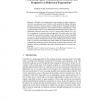Free Online Productivity Tools
i2Speak
i2Symbol
i2OCR
iTex2Img
iWeb2Print
iWeb2Shot
i2Type
iPdf2Split
iPdf2Merge
i2Bopomofo
i2Arabic
i2Style
i2Image
i2PDF
iLatex2Rtf
Sci2ools
ACOM
2004
Springer
2004
Springer
Formulating Agent Communication Semantics and Pragmatics as Behavioral Expectations
Abstract. Although several approaches to the semantics of agent communication have been proposed, none of them is really suitable for dealing with agent autonomy, which is a decisive property of artificial agents. This paper introduces an observation-based approach to the semantics of agent communication, which combines benefits of the two most influential traditional approaches to agent communication semantics, namely the mentalistic (agent-centric) and the objectivist (i.e., commitment- or protocol-oriented) approach. Our model makes use of the fact that the most general meaning of agent utterances lays in their expectable consequences in terms of agent actions, and that communications result from hidden but nevertheless rational and to some extent reliable agent intentions. In this work, we present a formal framework which enables the empirical derivation of communication meanings from the observation of rational agent utterances, and introduce thereby a probabilistic and utility...
| Added | 30 Jun 2010 |
| Updated | 30 Jun 2010 |
| Type | Conference |
| Year | 2004 |
| Where | ACOM |
| Authors | Matthias Nickles, Michael Rovatsos, Gerhard Weiß |
Comments (0)

